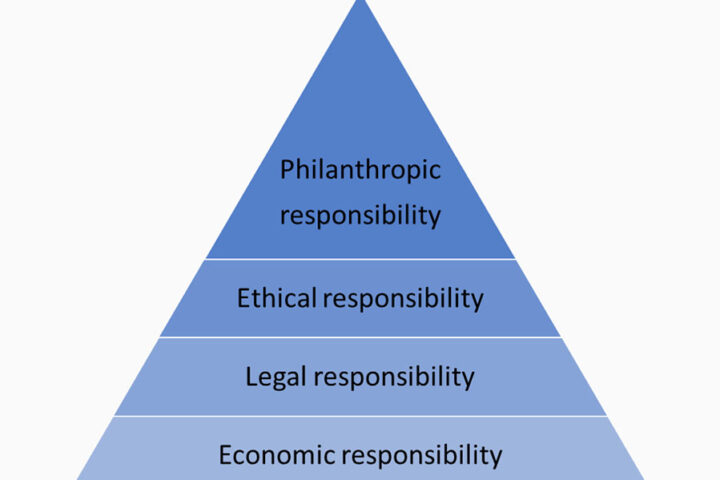Source: pexels-eva-bronzini-Small Business Related Marketing Slogan on Paper · Free Stock Photo
Social Responsibility isn’t just for big corporations. Understand how smaller businesses have taken CSR into account to promote their growth and customer satisfaction.
Corporate Social Responsibility (CSR) has been the preserve of rich corporates. This is no longer the case as Small and Medium Enterprises (SMEs) have caught up with the trends. This practice common within multinational firms, with hundreds of millions worth of assets, gradually took root in small enterprises that prove that morals and responsibilities of business are not for the big shots only. This is the reason why it is not surprising that SMEs are becoming more active than before in implementing CSR policies oriented towards positive change within societies and the surrounding nature as well.
CSR
Businesses that do follow CSR principles, are built up in a way to enable them help the society and the environment in a positive way. This obligation, in favor of the society, can also be manifested through different programs or plans, which are in accordance to the corporate endgame. Most of such companies would outline the activities that they have undertaken in support of CSR to both their internal and external stakeholders, rendering this information through figures dominated reports.
Among these are the several types of prevention and damage control activities including- the creation of standards for eco-friendly operations, fostering workplace equity inclusion, and equal opportunity, ensuring fair treatment of workforce, endowing local societies, and resolving ethical controversy in business practice among others. The purpose of CSR adoption of both the multinationals and the young companies is to go beyond making profits.
SMEs
Although general corporations may have greater financial capacities to purchase high-end CSR-like areas, it is the local establishments which seem to have better accessibility and a high level of efficiency. There is emerging evidence that small and medium enterprises are beginning to adhere to CSR primarily as a strategy for enhancing their competitiveness in the market and achieving sustained profitability in the future.
Research concerning CSR and SMEs has grown exponentially in the recent past. All indications of research activity in this field have been positive; there were more than 136 papers published in peer reviewed journals in the last decade. Most of the studies are empirical in nature and are found in highly rated academic journals emphasizing the tendency to adopt CSR policy within SME sector.
There are various aspects of CSR engagement that SMEs can adopt in their business:
- Sustainable development: As it has been noted, small size businesses are very active in embracing the concept of environmental preservation. It can include waste minimization, the production of green products, saving of energy or products from green suppliers.
- People: Businesses are generally well integrated into the societies in which they operate and therefore are more willing to respond to society’s needs directly.
- Employee Well-being: Implementing CSR practices can help SMEs promote fair labour practices. They are able to create healthier work environments which offer more flexibility, more opportunities, and fair wages to their workers.
Why does CSR matter?
For the small businesses, CSR is not merely a ‘good to have’ but a ‘must have’ strategy, since one can reap several strategic benefits:
- Building Trust and a sense of Responsibility: Small companies which are CSR friendly can also gain a positiveness in the society. The modern consumer is changing in attitude and purchases goods from socially responsible companies.
- Customer Loyalty: Companies with concern for the society are phenomenally rewarded with loyalty, when they have gained customers’ trust. It is because people will mostly opt for businesses that have a positive impact and benefit to the society.
- Attracting Talent: Information suggests that many workers, especially the newer ones, aim to work for firms that are socially responsible. It is also important to note that this boost in CSR helps grow new talent in small businesses unlike other companies that focus more on growth over purpose. The same helps the companies to transform into more active and excelling in performance in the long run.
- Long-term Growth: Long-term Growth is guaranteed for companies which engage in CSR. Strong community relationships and ethical practices can keep the business thriving far into the future.
The Difference
A big difference is made when even SMEs start engaging in CSR- it boosts the development of the community and improves the business of the company at the same time.
- Financial trading service, FP Markets, focuses on issues like Men’s mental and physical health and Youth development programs in Cricket to contribute to the well-being of communities and the environment.
- Checkr is a background screening company, that has incorporated the principles of CSR into its working and core values to focus especially on environmental sustainability and social justice. This has earned the company several accolades and recognition for its contribution.
- Chipotle Mexican Grill has been committed to ethical sourcing and sustainable practices for when it comes to getting ingredients. This includes ethical farming practices and community engagement.
- TOMs, the shoe retailer brand, was recognized as a Certified B Corporation (a company that meets the high standards of social responsibility) because of their multi-pronged approach towards matters of concern, including issues related to the people, the purpose, and the planet.
Resources
CSR
- What Is Corporate Social Responsibility? 4 Types. (2021, April 8). Business Insights Blog. https://online.hbs.edu/blog/post/types-of-corporate-social-responsibility
- Reckmann, N. (2019, April 22). What Is Corporate Social Responsibility? Business News Daily; businessnewsdaily.com. https://www.businessnewsdaily.com/4679-corporate-social-responsibility.html
SMEs
- Uzhegova, M., Lasse Torkkeli, & Sami Saarenketo. (2019). Corporate Social Responsibility in SMEs: Implications on Competitive Performance. ResearchGate; Nomos Verlag. https://www.researchgate.net/publication/329943716_Corporate_Social_Responsibility_in_SMEs_Implications_on_Competitive_Performance
- Corporate social responsibility (CSR) in SMEs: what we know, what we don’t know, and what we should know. (2024). Journal of Small Business & Entrepreneurship. https://doi.org/10.1080//08276331.2021.1951064
Why does CSR matter?
- Uzhegova, M., Lasse Torkkeli, & Sami Saarenketo. (2019). Corporate Social Responsibility in SMEs: Implications on Competitive Performance. ResearchGate; Nomos Verlag. https://www.researchgate.net/publication/329943716_Corporate_Social_Responsibility_in_SMEs_Implications_on_Competitive_Performance
- Corporate social responsibility (CSR) in SMEs: what we know, what we don’t know, and what we should know. (2024). Journal of Small Business & Entrepreneurship. https://doi.org/10.1080//08276331.2021.1951064
The Difference
- Weinger, A. (2024, January 8). Companies Committing Social Good: 9 Real-World CSR Examples. Doublethedonation.com. https://doublethedonation.com/top-csr-examples/ 1
- ADP Contributor. (2018, September 14). ADP BrandVoice: CSR For Smaller Companies: How To Start, What Works, What Doesn’t. Forbes. https://www.forbes.com/sites/adp/2018/09/14/csr-for-smaller-companies-how-to-start-what-works-what-doesnt/
- Donorbox. (2020, November 25). Donorbox. Nonprofit Blog. https://donorbox.org/nonprofit-blog/best-socially-responsible-companies

















